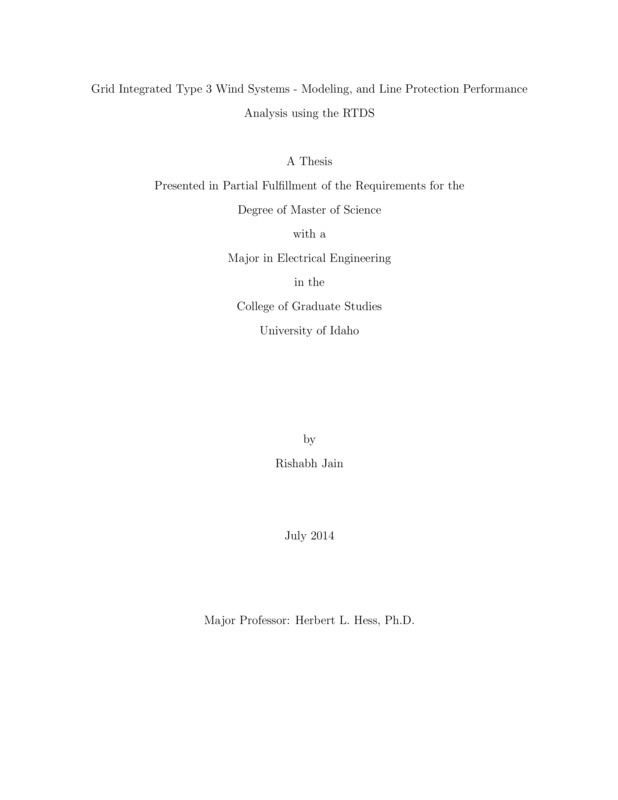Grid Integrated Type 3 Wind Systems - Modeling, and Line Protection Performance Analysis using the RTDS
Jain, Rishabh. (2014). Grid Integrated Type 3 Wind Systems - Modeling, and Line Protection Performance Analysis using the RTDS. Theses and Dissertations Collection, University of Idaho Library Digital Collections. https://www.lib.uidaho.edu/digital/etd/items/jain_idaho_0089m_10373.html
- Title:
- Grid Integrated Type 3 Wind Systems - Modeling, and Line Protection Performance Analysis using the RTDS
- Author:
- Jain, Rishabh
- Date:
- 2014
- Keywords:
- Doubly Fed Induction Generator Renewable RTDS Type 3 Wind energy
- Program:
- Electrical and Computer Engineering
- Subject Category:
- Engineering; Energy
- Abstract:
-
In this thesis, the line protection elements and their supervisory elements are analyzed in context of Type 3 (Doubly Fed Induction Generator based) grid integrated wind turbine systems. The underlying converter and controller design algorithms and topologies are discussed. A detailed controller for the Type 3 wind turbine system is designed and integrated to the grid using the RTDS. An alternative to the conventional PLL for tracking of rotor frequency is designed and implemented. A comparative analysis of the performance of an averaged model and the corresponding switching model is presented. After completing the WT model design, the averaged model is used to model an aggregate 10-generator equivalent model tied to a 230kV grid via a 22kV collector. This model is a great asset to understand dynamics, and the unfaulted and faulted behavior of aggregated and single-turbine Type 3 WT systems. The model is then utilized to analyze the response of conventional protection schemes (Line current Differential and Mho Distance elements) and their respective supervisory elements of modern commercial protection relays in real time by hardware-in-the-loop simulation using the RTDS. Differences in the behavior of these elements compared to conventional power systems is noted. Fault are analyzed from the relay's perspective and the reasons for the observed behavior are presented. Challenges associated with sequence components and relay sensitivity are discussed and alternate practices to circumvent these issues are recommended.
- Description:
- masters, M.S., Electrical and Computer Engineering -- University of Idaho - College of Graduate Studies, 2014
- Major Professor:
- Hess, Herbert L.
- Committee:
- Johnson, Brian K.; Cordon, Daniel
- Defense Date:
- 2014
- Identifier:
- Jain_idaho_0089M_10373
- Type:
- Text
- Format Original:
- Format:
- application/pdf
- Rights:
- In Copyright - Educational Use Permitted. For more information, please contact University of Idaho Library Special Collections and Archives Department at libspec@uidaho.edu.
- Standardized Rights:
- http://rightsstatements.org/vocab/InC-EDU/1.0/

